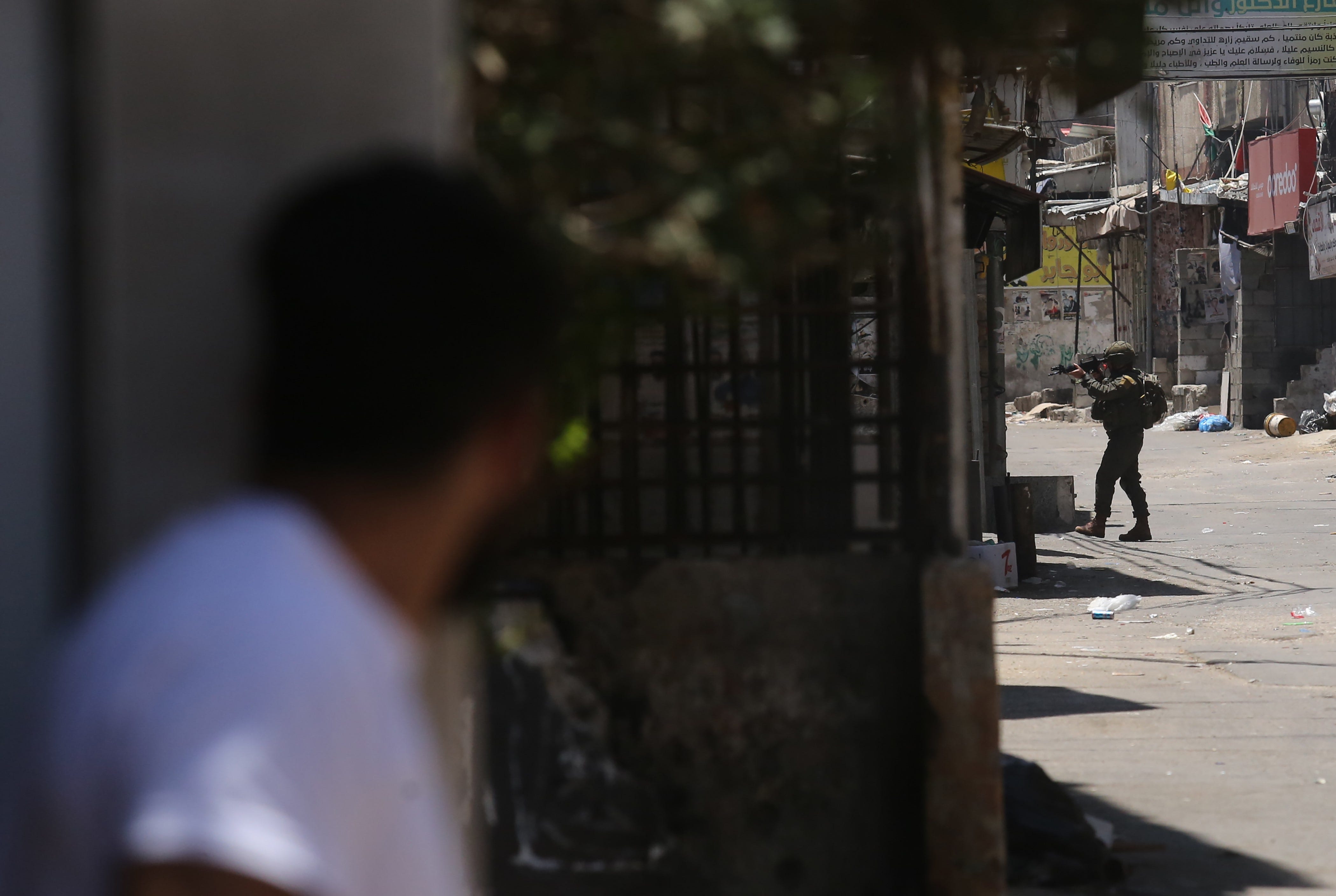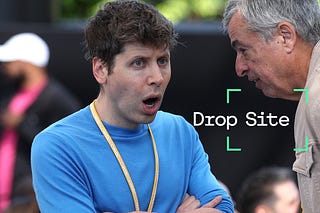
As the Bombing of Iran Took Center Stage, Israeli Forces Deployed Deeper Into the Occupied West Bank
"They are dealing with the West Bank as if the war is right here."

Hours before dawn on June 18, as Iran sent a wave of ballistic missiles into Israel, the Israeli army stormed Al-Walaja, a village in the occupied West Bank south of Jerusalem.
Moataz Al-Hajajleh, 21, had been spending the evening with friends in a neighbor’s garage, smoking hookah and sipping tea, when Israeli soldiers raided his uncle’s home nearby. The soldiers broke down the door, ransacked the house, and demanded to be taken to his uncle’s son’s residence.
On their way, they suddenly began beating his 50-year-old uncle, just in front of where Al-Hajajleh and his friends were hanging out.
“When my son saw the soldiers beating his uncle, he stood up. He didn’t even approach them—just called out from the doorway, asking why they were attacking his elderly uncle,” Abu Rashed told Drop Site. “They immediately let go of my brother, as if he hadn’t been the real target. Then they grabbed my son, beat him, dragged him into the house, and continued the assault on the veranda.”
Then an officer shot Al-Hajajleh three times. The bullets “went through his chest into the wall,” said Khader Al-Auraj, head of the village council, who went to the scene. “There was even flesh stuck to the wall from the bullet. Very quickly it became clear that it was a field execution, in the ugliest way.”
After its unprovoked strike on Iran on June 12, Israel accelerated another war, as well. The West Bank, already experiencing record levels of settler violence and demolitions, was immediately put under siege by the Israeli army. While a ceasefire still holds between Israel and Iran, the raids and arrests in the West Bank are only continuing with increasing violence. The military has deployed en masse across multiple cities, from Nablus to Hebron to Tulkarm, conducting violent overnight raids, home demolitions, mass evictions, and abductions.
Al Walaja straddles Jerusalem, Area B, where Israel exercises complete security control and shares civil control with the PA, and Area C, under full Israeli control. Thirty-five-year-old Abu Ali, who asked for anonymity due to safety concerns, told Drop Site that soldiers started banging on his door around 3 a.m. that night—a few hours after Al-Hajajleh was killed. They shattered the glass and forced their way into Abu Ali’s home, smashing furniture, and stealing cash.
Abu Ali’s two-year-old daughter watched the raid, bewildered. “How can she possibly understand what is going on?” he said.
Across the West Bank, communities live in fear of the next operation. “They are dealing with the West Bank as if the war is right here,” said Muhanned Qafesha, an activist with Youth Against Settlements and Hebron resident. “People are terrified.”
An estimated 1,000 Palestinians in the West Bank, including 30 children, have been killed by settlers or Israeli forces since Oct. 7, 2023. Over 45,000 Palestinians have been forcibly displaced over the same period, the largest displacement in the West Bank since 1967. Israeli authorities are increasingly treating the territory in ways that mirror the military domination and isolation once reserved for Gaza. Last week senior ministers of Likud, Prime Minister Benjamin Nentanyahu’s, party urged him to annex the West Bank by the end of July.
The Israeli military claimed without evidence that it arrested 400 “terrorists” from the West Bank during the Iran war, and killed eight. Those killed include multiple young men and teenagers, as well as a 61-year old man riding a bicycle in Tulkarem refugee camp and a 66-year old woman in East Jerusalem.
“Something very important going on right now is that the military is raiding villages that have had no issues with Israeli authorities in the past,” said Ayman Gharib, an activist with the Popular Resistance Committees in the Jordan Valley. “They come with tanks, guns, and military armored vehicles."
In Mukhmas, a Palestinian shepherding community in the central West Bank, Abu Muhammad Ka’abneh’s family has been constantly facing settler attacks. A few months ago, settlers burned his brother’s house down in the neighboring village.
Ka’abneh, who has four children, has been enduring constant theft and attacks by settlers. Typically, four or five Israelis arrive on his land and begin provoking him and his family. “Then this group turns into 100, complete with tractors and cars,” he said.
On June 20, the Israeli army declared Mukhmas to be a closed military zone. This order is set to remain in effect for a month, according to the notification document obtained by Drop Site.
Ka’abneh said the army told him that the closure was “for the purpose of protecting us from the increased settler assaults.” But, he said, the frequency of the attacks only increased. Settlers have even entered his home with their sheep and dogs, terrifying his children. They cut his water pipe, stole food for his animals and closed off roads in the villages with stones. Now, the attacks are never-ending.
“The settlers are here everyday. Why don’t they [the army] prevent them from entering?” he said. “It’s almost as if the whole thing is coordinated, as if the army and the settlers are communicating with each other beforehand.”
Mourad Jadallah, a legal researcher from al-Haq, is seeing these kinds of attacks daily across communities in the West Bank. “We’re no longer talking about small groups of settlers attacking a Palestinian house or burning it and stealing livestock,” he told Drop Site. “Now it’s 50 to 200 settlers, many of them armed, often backed by the Israeli police or army. There will be massacres committed by settlers in the near future.”
In Al-Mazra'a al-Sharqiya, east of Ramallah, 70 settlers reportedly attacked a stone factory and Palestinians who came to protect it, while the Israeli army was present.
Mass displacement to attacks is ongoing: in Al-Mu'arrajat, in the Jordan Valley, 30 families have already been forced to abandon their homes, with 20 more on the verge of leaving after settlers moved from home to home forcing families out at gunpoint.
“Israel’s ability to carry something like this out in the West Bank is unrestrained and limitless,” said Jadallah. “There is no Palestinian who is safe, and there is no safe place in Palestine.”
On June 12, hours before Israel conducted the first strikes on Iran’s nuclear sites and key leadership figures, Israeli cabinet ministers vowed to annex the West Bank and Gaza.
Israeli finance minister Bezalel Smotrich and heritage minister Amichay Eliyahu attended a conference in the Gaza-border town of Sderot held by veteran right-wing settlers. “Do we want Judea and Samaria? Do we want Syria? Do we want Lebanon? Do we want Gaza?” Eliyahu reportedly shouted to a crowd who cheered in response.
On July 2, 15 ministers from Netanyahu’s party, Likud, sent a letter to Netanyahu advocating for the West Bank to be fully annexed by the end of the month. They said that the support from the U.S. and President Donald Trump “have made it a propitious time to move forward with it now.”
“After the State of Israel’s historic achievements in the face of Iran’s axis of evil and its sympathizers,” the letter said, “the task must be completed and the existential threat from within must be eliminated, to prevent another massacre in the heart of the country.”
The letter was met with praise by far-right Israeli figures, including Smotrich, who said that as soon as Netanyahu “gives the order,” he will be ready to implement Israeli sovereignty over the territory “immediately.”
“If you ask me, what happened in Gaza, the genocide, forced eviction and transfer, starvation, killing, this is the incoming scenario for the West Bank,” said Jadallah from Al-Haq. “It will exploit every moment to further annexation. And the world just watches.”





















OMG horrifying. Brings tears to my eyes. How can anyone justify this kind of Israel sponsored terrorism. What disgusting IDF brutes.
Usual Zionist tactic. Steal and kill while the world is watching elsewhere.